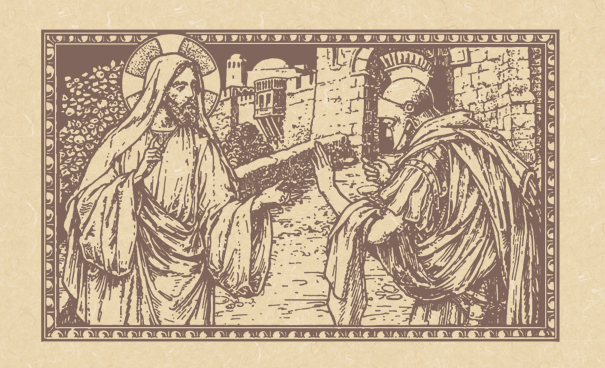Nulla Dies Sine Cruce!
The First Thursday of Lent.*
Lessons from the feria, according to the ordinary form of the Roman Rite:
• Deuteronomy 30: 15-20.
• Psalm 1: 1-4, 6.
• Luke 9: 22-25.
Lessons from the feria, according to the extraordinary form of the Roman Rite:
• Isaias 38: 1-6.
• Psalm 54: 23, 17-19.
• Matthew 8: 5-13.
The First Thursday of the Great Fast; and, the Feast of the Holy Apostle Archippus.
[Today is aliturgical in the Byzantine-Ruthenian Rite; there is no Divine Liturgy.]
FatherVenditti.com
|
 9:22 AM 2/19/2015 — Lent began yesterday, and today our Lord reminds us that “If any man has a mind to come my way, let him renounce self, and take up his cross daily, and follow me” (Luke 9: 23 Knox). And what is the disease of the Church in our time, indeed, in all times? The foolishness of pretending that Christianity can be lived without the Cross. That's not to say that any of us actually state outright that we can somehow have Christ without His Cross, but that we often conduct our daily lives that way. 9:22 AM 2/19/2015 — Lent began yesterday, and today our Lord reminds us that “If any man has a mind to come my way, let him renounce self, and take up his cross daily, and follow me” (Luke 9: 23 Knox). And what is the disease of the Church in our time, indeed, in all times? The foolishness of pretending that Christianity can be lived without the Cross. That's not to say that any of us actually state outright that we can somehow have Christ without His Cross, but that we often conduct our daily lives that way.
Years ago, when I was still in the seminary, I went to attend a lecture given by a very well-known theologian who was famous for his frequent descents against Church teaching—he's since been stripped of his authority to teach in the name of the Church, which doesn't surprise me—and the talk was followed by a question and answer period. I didn't bother to ask any questions—I didn't see the point—but someone else did. He had said in his talk that Church teaching on most of the questions of sexual morality was wrong because the vast majority of Catholics today simply reject that teaching, if not explicitly, then certainly by the way they live their lives, eschewing premarital chastity, using contraception in marriage, accepting homosexuality as normal, and so on; he argued that the near universal practice of so many people constituted what theologians have traditionally called the sensus fidei or “the sense of the faithful,” and that the Church had to listen to this and accept it as the will of Christ. And a woman in the audience, whom I later discovered was also a rather well-known theologian, stood and asked him, “If, Father, what you say is true, and that the Church is wrong to require the Christian to do what is onerous or forbid what has become universal, then what becomes of the role of the Cross in the life of the Christian?” Of course, he had no answer, because deviant theology begins with a lack of spirituality, and that's exactly what Christianity becomes when you cut the Passion out of the Gospel: it becomes a religion without prayer, little more than a program for social service; certainly not something for which someone might sacrifice his life as a martyr, or regard as a road-map to heaven.
In spiritual direction—which I don't do anymore—one of the first signs of lukewarmness in a soul is contempt for sacrifice, especially in the little things: a desire to avoid any form of mortification or suffering at all costs and to view such a circumstance as unjust. A soul in this state of lukewarmness is continuously complaining about how unfair something or someone is to him, and is always accompanied by a lack of prayer. St. John of the Cross says that the reason so few people reach a high state of union with God is because most people don't want to; he says, “if anyone wants one day to possess Christ, never let him seek him without the Cross.”**
And, of course, we must pay heed to the precise nature of our Lord's words: “…let him … take up his cross daily….” Nulla dies sine cruce! “No day without its cross” is the old spiritual maxim. Occasionally we meet the Cross in some great, life-altering difficulty, like a serious illness or an economic downfall or the death of a loved one, and those crosses are easy enough to recognize; but, just as important, if not more so, is how we carry the daily cross, the cross of inconvenience, the cross of frustration, the cross of lonliness, the cross of depression, the cross of our own personal moral struggles. St. Jose María Escrivá says:
… do not forget that being with Jesus means we shall most certainly come upon his Cross. When we abandon ourselves into God's hands, He frequently permits us to taste sorrow, loneliness, opposition, slander, defamation and ridicule, coming both from within and from without. This is because He wants to mold us into His own image and likeness. He even tolerates our being called lunatics and our being taken for fools.
This is the time to love passive mortification, which comes, hidden perhaps, or barefaced and insolent, when we least expect it.***
What's ironic about the attempt to run away from the Cross is that it accomplishes exactly the opposite of what it's intended to accomplish: the Christian who goes through life systematically avoiding sacrifice will not find God, will not find happiness; and, only after it's too late will he realize that what he's been taking such care to avoid is really his own salvation.

* The First Thursday of Lent is what the Missal refers to as "The Thursday after Ash Wednesday." Cf. the note regarding the designation of days during Lent on this site, found here.
** The Living Flame of Love, II, 7.
*** Christ Is Passing By, 176.
|

